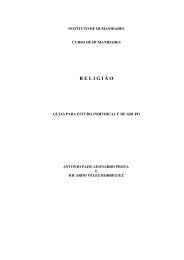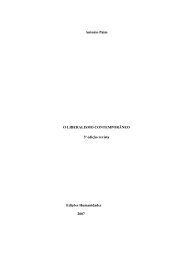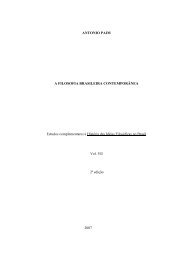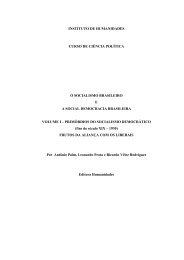Tratado de Ética - Instituto de Humanidades
Tratado de Ética - Instituto de Humanidades
Tratado de Ética - Instituto de Humanidades
You also want an ePaper? Increase the reach of your titles
YUMPU automatically turns print PDFs into web optimized ePapers that Google loves.
astreá-lo porquanto nos move empenho mais mo<strong>de</strong>sto, o <strong>de</strong> compreen<strong>de</strong>r as circunstâncias<br />
inglesas da primeira meta<strong>de</strong> do século XVIII.<br />
Não se trata <strong>de</strong> supor que os gran<strong>de</strong>s pensadores ingleses se tenham <strong>de</strong>sobrigado<br />
da imposição <strong>de</strong> manifestar-se acerca da valida<strong>de</strong> da hipótese da religião natural. O próprio<br />
Hume <strong>de</strong>ixou para ser publicado após a sua morte um ensaio acerca do tema (11) o que, por sua<br />
vez, sugere tenha <strong>de</strong> fato perdido toda urgência.<br />
Outro assunto <strong>de</strong> índole religiosa que supostamente encantou a imaginação dos<br />
ingleses, ainda que por um período não muito dilatado, correspon<strong>de</strong> à doutrina que se chamou<br />
<strong>de</strong> entusiasmo. Segundo esta, o homem po<strong>de</strong> receber uma iluminação divina, persuasiva <strong>de</strong><br />
<strong>de</strong>terminadas ações, cujo lema era Deus in nobis (Deus está conosco). Locke expressou<br />
publicamente sua preocupação com a eventualida<strong>de</strong> da difusão <strong>de</strong> semelhante doutrina, a<br />
ponto <strong>de</strong> acrescentar, na 4ª edição do Ensaio sobre o entendimento humano, aparecida em<br />
1700, um capítulo para combatê-1a. (12) Anthony Cooper (1671/1713), que é personagem<br />
central no <strong>de</strong>bate que estudaremos, a partir do capítulo subseqüente, também revela idêntica<br />
preocupação ao voltar a este assunto no livro A Letter Concerning Enthusiasm (1708). O certo<br />
é que o fenômeno revelou-se transitório.<br />
Parece fora <strong>de</strong> dúvida a proeminência crescente assumida pela discussão teórica<br />
acerca da moral social, que reúne expressiva bibliografia. Sem qualquer pretensão <strong>de</strong> esgotála<br />
mas apenas para dar uma idéia <strong>de</strong> sua magnitu<strong>de</strong>, po<strong>de</strong>-se mencionar, a partir do Enquiry<br />
into the Original of our I<strong>de</strong>as of Beauty and Virtue, <strong>de</strong> Francis Hutcheson (1649/1746),<br />
publicado em 1725, os seguintes livros: em 1726, A Letter to a Deist concerning the Beauty of<br />
Moral Virtue <strong>de</strong> John Balguy; Fifteen Sermons, <strong>de</strong> Joseph Butler e The Foundation of<br />
Morality in Theory and Practice, <strong>de</strong> John Clarke; em 1728, An Essay on the Nature and<br />
Conduct of the Passions and Affections, <strong>de</strong> Francis Hutcheson; An Enquiry into the Original<br />
of Moral Virtue, <strong>de</strong> Archibald Campbell; e The Foundation of Moral Goodness – Part I, <strong>de</strong><br />
John Balguy; em 1729, The Fable of the Bees – Part II, <strong>de</strong> Bernard Man<strong>de</strong>ville; The<br />
Foundation of Moral Goodness – Part II, <strong>de</strong> John Balguy; e Reflections on the Fable of the<br />
Bees, <strong>de</strong> Francis Hutcheson; em 1731, Dissertation concerning the Fundamental Principle of<br />
Virtue or Morality, <strong>de</strong> John Gay e A Second Letter to a Deist, <strong>de</strong> John Balguy; em 1732,<br />
Alciphon, <strong>de</strong> George Berkley; An Enquiry into the Origin of Honour and the Usefulness of<br />
Christianity in War e A Letter to Dion Ocasioned by his Alciphron, <strong>de</strong> Bernard Man<strong>de</strong>ville;<br />
em 1735, Letters between Mr. G. Burnet and Mr. Hutcheson concerning Virtue or Moral<br />
Goodness; em 1736, The Analogy of Religion, <strong>de</strong> Joseph Butler; em 1739, The Treatise of<br />
Human Nature, <strong>de</strong> David Hume; em 1741, Essays – Moral, Political and Literary, <strong>de</strong> David<br />
Hume; em 1747, Enquiry into the Orgin of the Human Appetites and Affections, <strong>de</strong> David<br />
Hartley e A Short Introduction to Moral Philosophy, <strong>de</strong> Francis Hutcheson; em 1749,<br />
Observations on Man, <strong>de</strong> David Hartley; em 1751, Essays on the Characteristics, <strong>de</strong> John<br />
Brown; Enquire concerning the Principles of Morals, <strong>de</strong> David Hume e Essays on the<br />
Principles of Morality, <strong>de</strong> Henry Home, Iord Kames; em 1755, System of Moral Philosophy,<br />
<strong>de</strong> Francis Hutcheson; em 1758, Review of the Principal Questions in Morals, <strong>de</strong> Richard<br />
Price; e, em 1759, The Theory of the Moral Sentiments, <strong>de</strong> Adam Smith.<br />
São cerca <strong>de</strong> trinta títulos, sem contar as reedições que mereceram diversos dos<br />
livros mencionados, em pouco mais <strong>de</strong> três décadas, não computadas as obras estritamente<br />
(11) Diálogos sobre a religião natural, publicados em 1779, três anos <strong>de</strong>pois da morte do autor. Pela dificulda<strong>de</strong><br />
em i<strong>de</strong>ntificar qual personagem o representaria, o livro não conseguiu precisar qual seria a posição <strong>de</strong> Hume.<br />
(12) Cf. Raymond Polin – La politique morale <strong>de</strong> John Locke, Paris, PUF, 1960, p. 66-67.<br />
94






